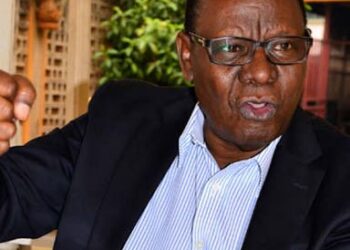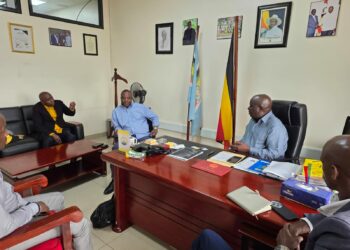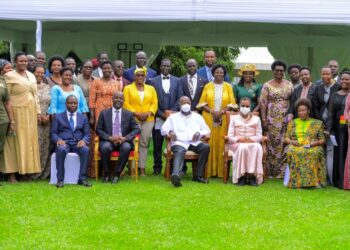Uganda’s Ambassador to the United Arab Emirates (UAE), His Excellency Zaake Wanume Kibedi, has unveiled Jinja and Busoga as prime destinations for investment, showcasing the region’s vast opportunities in agriculture and tourism.
Addressing a delegation of 10 representatives from various private companies in the UAE, Ambassador Kibedi highlighted the region’s rich cultural heritage, natural beauty, and agricultural potential as key areas for foreign investors to explore.
The UAE delegation, which included agro-industry investors, agronomists, financers, traders, and agriculturalists, visited Busoga, a subregion of more than 4.5 million people to scout for potential investment opportunities and gather information about the local market.
During their stay, they participated in the 31st Source of the Nile Agriculture Show, visited Maganjo Grain Millers, Kakira Sugar Works, and Hass Avocado Farmers in Mayuge, and held business-to-business meetings with local entities.
Ambassador Kibedi emphasized that the UAE delegation’s visit aligns with Uganda’s 10-fold economic growth strategy, which aims to increase the country’s economy from $50 billion to $500 billion by 2040.
The strategy focuses on key sectors such as agro-industrialization, tourism, mineral development, and science and technology innovation.
“…the composition of this delegation comprises agro-industry investors, agronomists, financers, traders and agriculturalists who have visited some entities…,” Ambassador Kibedi said, adding that the visit is a testament to the growing interest in Uganda’s economy.
Ambassador Kibedi also assured the UAE investors of attractive incentives, including tax holidays, freedom to repatriate profits, and a peaceful and friendly environment.
He also highlighted Uganda’s strategic location, abundant natural resources, and growing market as key advantages for investors.
In a passionate address to the people of Busoga and the politically volatile Jinja city in particular, Ambassador Kibedi urged the youth to seize opportunities in government and privately sponsored projects to fight unemployment and poverty.
Citing the oft-quoted metaphor that “money dislikes noisy and chaotic or conflict-ridden environments,” he warned against engaging in criminal activities and stressed the importance of a peaceful and stable environment in fostering economic growth and development.
Jinja City Council Speaker Bernard Mbayo, who represented the city leadership, heaped praises on Ambassador Kibedi for his efforts in promoting trade and investment between Uganda and the UAE.
Mbayo assured the UAE investors of total support and highlighted Jinja’s strategic location as a hub for trade and commerce.
“…leadership is not about making noise and party slogans before the camera but to strategically work collaboratively and network with fellow leaders whether in the government or private sector and NGOs to cause socio-economic transformation,” Mbayo said.
As an objective leader, Bernard Mbayo says although he belongs to the opposition FDC, he is bound to welcome all pro-people initiatives aimed at fostering the welfare of the citizens.
Mbayo also addressed concerns about the horrible state of roads in Jinja City, saying, the city leadership are in talks with the central government and that very soon some partners will renovate up to 200 km of roads in the city.
The Foreign Affairs Ministry Permanent Secretary Vincent Waiswa Bagire assured the investors of Uganda’s predictable tax regime, which has motivated foreign investors.
A tax regime refers to a set of rules, laws regulations and policies that govern the taxation of individuals and businesses in a particular country. It includes tax rates which is the percentage of income or profits that are subject to taxation, tax laws, tax administration and tax incentives.
In the context of this news article, Uganda’s predictable tax regime is attractive to foreign investors providing stability and certainty for businesses operating in the country.
Uganda allows foreign investors to repatriate profits with minimal restrictions which makes investors feel more secure knowing they can retrieve their earnings.
Experts also say repatriation reduces the risk of assets being frozen or confiscated and investors can access their profits, reinvest or distribute to shareholders.
He also highlighted the country’s numerous trade integrations, including the African Continental Free Trade Area (AfCFTA), the East African Community (EAC), and the Common Market for Eastern and Southern Africa (COMESA).
Uganda’s economic growth strategy draws inspiration from Singapore’s remarkable transformation.
The tiny Asian nation has become a global trade and financial hub, attracting foreign investment and fostering economic growth through its pro-business environment, transparent regulatory framework, and efficient laws governing international trade and investment.
As the UAE delegation concluded their visit, they expressed optimism about the potential for partnership and engagement with Ugandan entities.
With its vast opportunities in agriculture and tourism, Uganda is poised to attract significant investment and drive economic growth, ultimately improving the lives of its citizens.
As Uganda woos foreign investors with promises of a conducive business environment, the cash-trapped Jinja City leadership and the central Government must walk the talk. The state of roads in Jinja City, particularly those leading to the industrial hub is a stark reminder that infrastructure development is crucial for economic growth.
Commentators say it is embarrassing that the government appears to be behaving like an unthankful farmer who continues to milk the cow but does not want to give it hay.
They say the high appetite for taxes is not matched with the energy for feeding the economy and the ball is in their court as residents and Ugandans anxiously wait to see action as the country prepares for general elections in six months’ time.
Do you have a story in your community or an opinion to share with us: Email us at editorial@watchdoguganda.com














